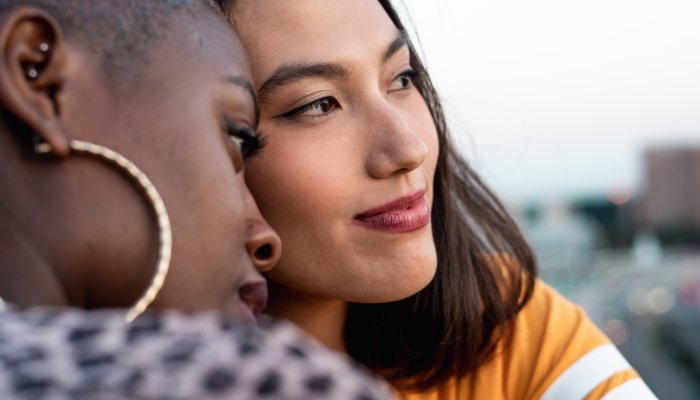As A Queer Person, Relationship Anarchy Helped Me Create The Family I Need

Relationship anarchy is a term for viewing all relationships as having no rules other than the ones all involved parties agreed to. Although relationship anarchy is often used in the context of ethical nonmonogamy, relationship anarchy can apply across relationships with family members, friends, and others. Essentially, it refers to viewing all relationship types as equal. The importance of a relationship doesn’t have more or less value because of the presence of blood or sex. It relies solely on your bond with that person.
I’m close to my family, sure. I figured I was supposed to be. But at the time I was exploring my sexuality, I didn’t feel like my emotions were safe with them. On the other hand, I had cemented bonds with people with who I had no fear. We were exploring our thoughts and beliefs together, and anything I said was something we could talk about openly. The buds of relationship anarchy were forming.
Think of that old saying, “Blood is thicker than water.” It’s meant to convey the idea that family always comes first. But I choose to live by another saying: “The blood of the covenant is thicker than the water of the womb.” This phrase says the exact opposite. Relationships with family aren’t more important just because of a shared bloodline.
For some, relationship anarchy seems like a radical idea. But for me, it’s more logical than anything. It’s used by those who reject societal expectations of how close people are supposed to be to others.
Realizing I’m a member of the LGBTQ+ community inadvertently caused a shift in my thought process. Just like I was learning that I didn’t have to honor the traditional markers for what being “masculine” or “feminine” was supposed to be, I was also learning that I didn’t need to abide by the pre-distributed labels placed on certain types of relationships. Not only did I begin to look at romantic and sexual relationships differently, but I began to understand that my previous view of what’s an important relationship was based on societal expectations: that I should love someone just because we’re related by blood, or that none of my friends who have been there for me for years (and vice versa) could ever come close to the distant relative I only see during the holidays.
For me, the idea of ditching the relationship hierarchies in favor of relationship anarchy was easy enough to adopt, although my family has never been on board. My mom’s always been one to say that friends come and go. At the end of the day, family is all you have, and you have to keep them close, she would say. My grandmother also hammered this idea home, saying that my “little friends” would never be there when I needed them.
But that ended up just not being the case. I have the friends I have today because we’ve shown each other over the years that we’re always here for one another.
And it wasn’t just our shared queerness that brought us together: These are the people I turned to when I was boiling over with self-hatred. My friends understood me because we were dealing with the same kind of negative feelings. We all hated ourselves in some way, and it was easy to sit in that together.
My mom, though, could never understand why I felt the way I did, and it was difficult to find the words to make my thoughts make sense. She would say things like “Happiness is a choice,” but I could never understand why she thought I would choose this.
Looking back, I was definitely depressed, and I don’t believe my mother understood how serious my feelings were. But at that time, speaking to her about any of that seemed almost impossible. Reaching out to her for help felt like blasts of judgment every time. Our conversations left me feeling frustrated and isolated.
I realize now that a lot of the reason I even made it through my high school years is that my friends and I were all depressed together. We were all trying to find small ways to make it through each day and support each other. We talked about how we purposefully looked forward to seeing each other or reading the next chapters in our favorite books.
This article was originally published by mindbodygreen.com. Read the original article here.




